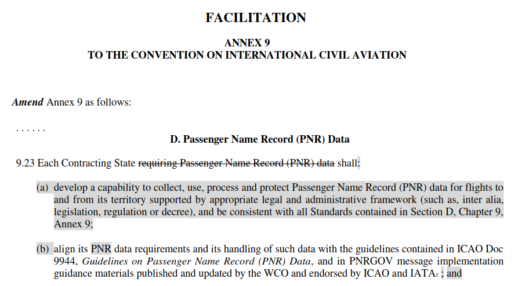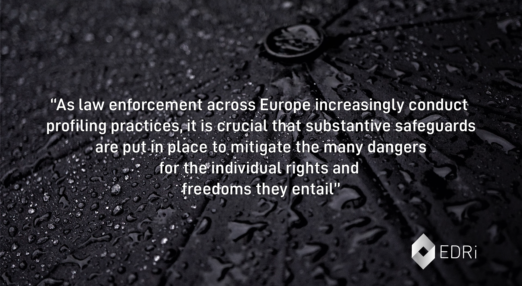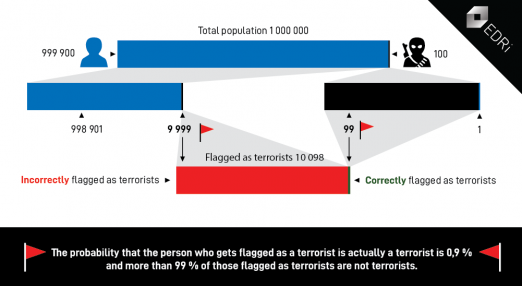Travel surveillance: member states seek to circumvent court judgment on PNR
In June this year the the Court of Justice ruled that the rules governing the EU's system for travel surveillance and passenger profiling, set out in the Passenger Name Record (PNR) Directive, must be "interpreted restrictively" to conform with fundamental rights standards. The ruling requires substantial changes to member state practices - but the Council, in time-honoured fashion, is looking at how to circumvent it, and to ensure the greatest possible freedom of manouevre for law enforcement authorities.
Filter resources
-

Travel surveillance: member states seek to circumvent court judgment on PNR
In June this year the the Court of Justice ruled that the rules governing the EU's system for travel surveillance and passenger profiling, set out in the Passenger Name Record (PNR) Directive, must be "interpreted restrictively" to conform with fundamental rights standards. The ruling requires substantial changes to member state practices - but the Council, in time-honoured fashion, is looking at how to circumvent it, and to ensure the greatest possible freedom of manouevre for law enforcement authorities.
Read more
-

Mass surveillance of external travellers may go on, says EU’s highest court
On 21 June 2022, the Court of Justice of the European Union (CJEU) delivered its judgment in case C-817/19 Ligue des droits humains from Belgium which challenged the validity of the Passenger Name Records (PNR) Directive. Regrettably, the PNR Directive as such was found to be compatible with the Charter of Fundamental Rights.
Read more
-

The EU’s own ‘Snowden Scandal’: Europol’s Data Mining
On 3 January 2022, the European Data Protection Supervisor (EDPS), which supervises the processing of personal data by the EU’s law enforcement agency, Europol, ordered Europol to delete data held in its databases on individuals with no established link to criminal activity.
Read more
-

Opinion on the Passenger Name Record CJEU case
In Case-817/19, Belgium’s Constitutional Court has asked the EU Court of Justice whether the PNR Directive (2016/681) is compatible with the Charter of Fundamental Rights. The hope must be that the Court will stand up for the rights of individuals, enforce the Charter of Fundamental Rights, and declare the PNR Directive (like the Data Retention Directive) to be fundamentally in breach of the Charter.
Read more
-

ICAO mandates worldwide government surveillance of air travelers
Playing out the endgame we predicted last year of a two-decade campaign by the US government to establish a global regime of government surveillance of air travelers, the International Civil Aviation Organization (ICAO) has adopted an amendment to the Chicago Convention on Civil Aviation that will require each of the 193 state parties to that treaty — essentially every national government in the world — to require all airlines operating international flights to provide a designated government agency with complete mirror copies of all reservation records (“Passenger Name Records“) in a standard PNRGOV transmission format.
Read more
-

Stuck under a cloud of suspicion: Profiling in the EU
As facial recognition technologies are gradually rolled out in police departments across Europe, anti-racism groups blow the whistle on the discriminatory over-policing of racialised communities linked to the increasing use of new technologies by law enforcement agents.
Read more
-

CJEU to decide on processing of passenger data under PNR Directive
On 20 January 2020, the District Court of Cologne, Germany, submitted to the Court of Justice of the European Union (CJEU) the question whether the European Passenger Name Record (PNR) Directive violates fundamental rights. EDRi member Gesellschaft für Freiheitsrechte (GFF, Society for Civil Rights) initiated the proceedings against the directive, which allows for authorities to […]
Read more
-

Austrian Passenger Name Records complaint – the key points
Austrian EDRi member epicenter.works filed a complaint with the Austrian data protection authority (DPA) about the Passenger Name Records (PNR) in August 2019, with the aim to overturn the EU PNR Directive. On 6 September, the DPA rejected the complaint, which was a good news, because that was the only way to lodge a complaint […]
Read more
-

PNR complaint advances to the Austrian Federal Administrative Court
On 19 August 2019, Austrian EDRi member epicenter.works lodged a complaint with the Austrian data protection authority (DPA) against the Passenger Name Records (PNR) Directive. After only three weeks, on 6 September, they received the response from the DPA: The complaint was rejected. That sounds negative at first, but is actually good news. The complaint […]
Read more
-

Why EU passenger surveillance fails its purpose
The EU Directive imposing the collection of flyers’ information (Passenger Name Record, PNR) was adopted in April 2016, the same day as the General Data Protection Regulation (GDPR). The collection of PNR data from all flights going in and out of Brussels has a strong impact on the right of privacy of individuals and it […]
Read more
-

EU Council Presidency outlines future counter-terrorism priorities
A note produced by the Romanian Presidency of the Council of the European Union sets out the EU’s response to terrorism since 2015. It highlights the main measures adopted and calls for a “reflection process on the way forward” in a number of areas including “interoperability and extended use of biometrics”; implementing the EU Passenger […]
Read more
-

Denmark prepares for passenger data exchange with the EU
In 2016, the European Union adopted the Passenger Name Record (PNR) Directive which obliges Member States to collect PNR data on all flights to third countries and exchange this information with other Member States through the Passenger Information Units (PIUs).
Read more
